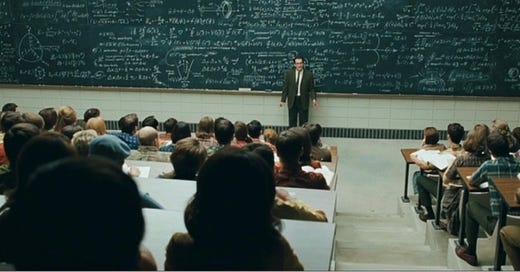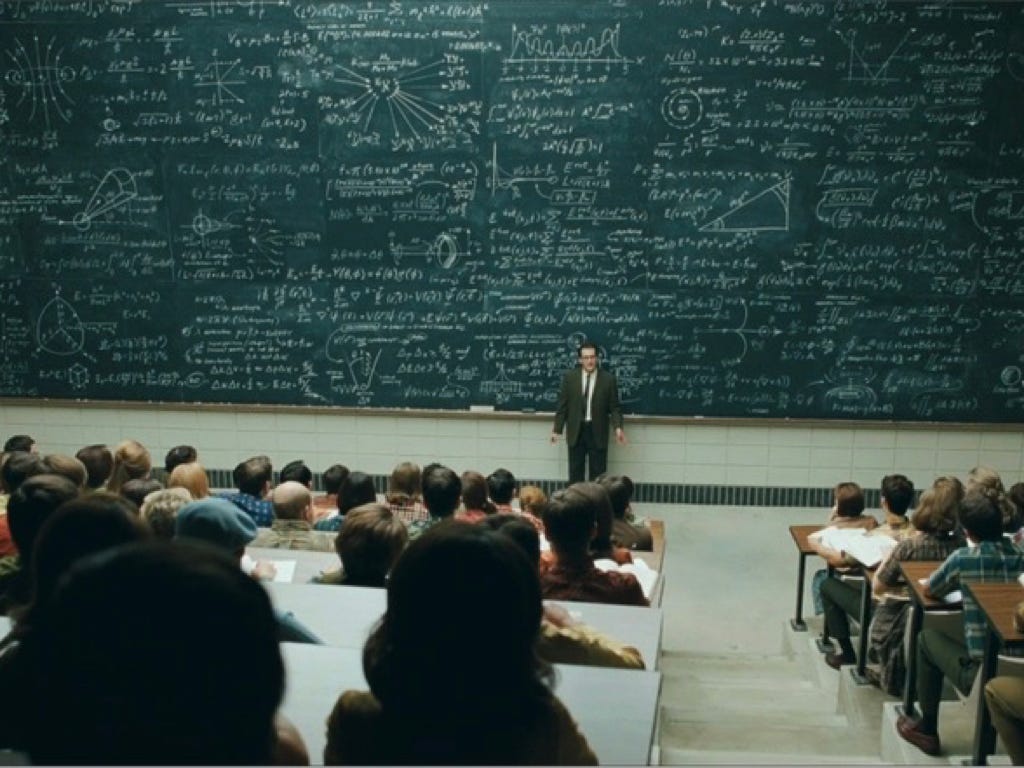It's not sexy, but I feel like Sal Khan’s recent video introducing his Academy’s GPT-fueled AI tutor augurs the future of the teaching profession — and not just at Khan Academy.
The video is twenty minutes long, although I recommend watching the whole thing. But even if you only duck in for a few minutes, you’ll see what I mean.
The tutor is already fully capable of offering personalized feedback, hints and suggestions for just about any topic for which there are already clearly established answers -- from solving math equations with parentheses to digesting John Locke’s political philosophy.
And therein lies the rub.
Up to now, since at least the days of the Greek Gymnasium, the foundation of teaching has always been about transmission. I know something that you don’t, so show up to this space, at this time (and this cost), and I’ll break it down for you so you can know it, too.
If you were to sum it up in a picture, it would basically be this:
Of course, the essence of that logic has been flawed for a while now -- first because of the Internet, and then because of the ability to put the Internet in our pocket and carry it anywhere.
In fact, turn the camera around on that same lecture hall today, and this is what you’ll see:
But now we’ve entered a new chapter — dare I say, a Technological Singularity (20 years early) — one in which Chat-GPT in particular, and the daily flood of AI tools more generally, has changed the nature of the teacher/student relationship even more irrevocably than before.
As a result, from this day forward, the job of a teacher REALLY needs to stop being about transmission.
So what should it start being instead?
Montessori schools offer a compelling, century-old answer to that question. After all, they don’t even use the T-word, referring instead to the adults who work with the kids as either Directresses or (my personal favorite) Guides.
They can do that, of course, because so much attention goes into the pre-construction of the environment in which kids are free to navigate. Indeed, in a Montessori classroom, the knowledge resides in the materials, not the teacher. Better yet, by being freed from the need to be the keeper of the knowledge, the adult is freed to be the keeper of the children — their needs, their interests, their relationships, and their emerging sense of self.
Clearly, it’s time that all schools, and all teachers/directresses/guides, should prioritize this as their superordinate goal.
But even in a Montessori setting, knowledge delivery is still a primary goal. And in my mind, the real opportunity before us rests in realizing that these amazing new AI tools are only as helpful as the quality of the questions we ask them.
In which case, the future of teaching is not about transmission, but it is about the other trans- words: transmedia exploration, transdisciplinary weaving, transcultural understanding, and, yes, personal and societal transformation.
To get there from here, however, we may need to let AI “teach” any topic for which there are already clearly established answers — from math and John Locke. And then to let the humans guide one another in the more meaningful, emergent work of considering which questions linger among us, like an everlasting itch, awaiting our discernment — and a deeper destiny.






Appreciating your distinction-making. The German concept of “Bildung” (character development or growth) adds another dimension to the potential influences of the teacher/guide/‘grower’. I think that character is best taught by example (the character of the teacher or guide themselves). Character is a whole discussion, I know. 😂
Totally agree with you on how teaching has to change in the ChatGPT era. Here’s my take on it: https://open.substack.com/pub/jenniferbrowdyphd/p/how-would-einstein-have-used-chatgpt?r=77vfa&utm_campaign=post&utm_medium=email